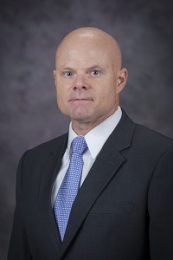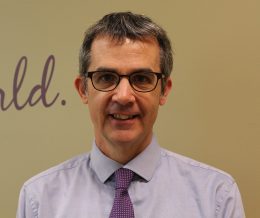Tag: Spotlight
Faculty Spotlight: Professor Phillip Vardiman, Athletic Training
 The Athletic Training Program was recently selected by the Office of Assessment for the 2017 Excellence in Assessment Citation, which highlights exemplary assessment processes and practices at K-State.
The Athletic Training Program was recently selected by the Office of Assessment for the 2017 Excellence in Assessment Citation, which highlights exemplary assessment processes and practices at K-State.
Phillip Vardiman, director of K-State’s athletic training program and associate professor in the College of Human Ecology, said the collaborative environment in the program has led to its success. “It’s definitely a team effort,” said Vardiman. “There’s not one of us that can take full credit for this type of accolade. It’s something that we’re all really proud of.”
In addition to meeting the program requirements at K-State, the athletic training program is also accredited by the Commission on Accreditation of Athletic Training Education (CAATE). According to Vardiman, this has assisted the athletic training program in honing its assessment methods. “The big piece for us that is helpful is that we’re an accredited program,” said Vardiman. “We’re utilizing best practices… and selecting some of the items we feel best represent the areas we need to quantify for the assessment program.”
The Excellence in Assessment Citation was awarded to the athletic training program for the efforts and achievements in the following areas:
- Specificity and rigor in critical thinking assessments.
- Multiple rounds of assessment that provide feedback for students and document increased levels of achievement.
- Assessment tasks that reflect authentic, real-world learning expectations.
- Clear benchmark levels of achievement that expose specific needs.
- The use of results to guide instructional enhancement.
- Well-designed assessment of academic and professional integrity.
Vardiman said these areas are met through sequential learning. Students are taught hands on athletic training skills that are then used in their clinical sites, where they are evaluated by a preceptor. This method, said Vardiman, “is a unique undergraduate experience compared to other programs on campus, providing a real world scenario where there would be actual treatment and patient care.”
The students are taught to develop a deductive reasoning thought process. Athletic training students need to be able to assess a patient’s injury and from there, determine treatment methods. “That’s a sequential learning process that we go through and we’re able to assess each component as they go through it,” said Vardiman. Students in their final year of the program are assessed globally on their ability to evaluate and treat a patient from start to finish.
Vardiman has found Canvas to be helpful for course instruction and hopes to have the entire faculty using it to link the assessment methods to grading mechanisms by the end of next year. Currently, Vardiman is working on continuing to build the athletic training program, by supporting the undergraduate degree while expanding to a graduate program.
Vardiman has received multiple awards for his work in higher education. He was recently named the 2016 Kansas Athletic Trainer of the Year by the Kansas Athletic Trainers Society (KATS), and is a previous recipient of the National Athletic Trainers Association Athletic Training Service Award. Additionally, Vardiman served as the athletic trainer with the medical team supporting U.S. track and field athletes in Rio de Janeiro during the 2016 Olympics.
The award will be presented to the athletic training program at the Institute for Student Learning Assessment in October. For more information on the athletic training program, please visit: http://www.he.k-state.edu/fndh/ugrad/athletictraining/
Faculty Spotlight: Greg Eiselein
 Great ideas can often come from the strangest of situations. For Dr. Greg Eiselein, Donnelly Professor of English and Director of K-State First, the idea for a first-year experience program came about while working on the first task force for the K-State 8. One of the conclusions this task force made was that creation of a first-year experience program would be beneficial for new students. Several faculty members and administrators liked the concept and began meeting unofficially to discuss ideas and implementation.
Great ideas can often come from the strangest of situations. For Dr. Greg Eiselein, Donnelly Professor of English and Director of K-State First, the idea for a first-year experience program came about while working on the first task force for the K-State 8. One of the conclusions this task force made was that creation of a first-year experience program would be beneficial for new students. Several faculty members and administrators liked the concept and began meeting unofficially to discuss ideas and implementation.
Provost April Mason encouraged their work, which started with a pilot study to demonstrate the positive impact that a program like this could have. “From the very beginning of the first-year experience program, K-State First was committed to assessment,” said Eiselein. “We decided from the get go that assessment would be the foundation of everything we did.”
What resulted was K-State First, the University’s first-year experience program, which was launched six years ago and has had already some impressive results. Eiselein said that the four main areas of measurable success have been: higher retention rates from freshman to sophomore year, graduation rates and improved time to degree, higher overall GPA, and a greater level of student engagement.
Most importantly, said Eiselein, students are excited about the courses they are taking and excited about college itself. This has led to high engagement rates, with 84 percent of students reporting having an “excellent teacher” and 68 percent having an “excellent course” in the fall of 2016.
The student learning outcomes used to assess the success of the program are critical thinking, communication, community building, and application of learning. According to the K-State First website, these courses “have been developed and organized for students to achieve maximum success during their first-year.”
Departmental collaboration has been a key to the program’s success. Working with other departments to continue to engage first-year students in exciting courses is something many professors have been eager to assist with, said Eiselein.
Just six years after its implementation, this great idea continues to grow, as K-State First engages first-year students and prepares them for a great college experience.
For more information on the assessment methods used for K-State First, please click here.
Faculty Spotlight: Don Kurtz
Dr. Don Kurtz, associate professor of social work, is no stranger to the work of assessment. At the start of his day, he had already had a meeting with faculty on evaluative measures.
The environment in the social work program is a collaborative one. “All of our professors are committed to (evaluation),” said Kurtz. Many in the program, including Kurtz, have taken on AAC&U VALUE Rubrics, available here. Kurtz has used the rubrics in a variety of ways: to monitor discussion boards, by adapting them to assess a written assignment, and to save time. Especially in large, online courses, Kurtz said the benefits of rubrics are extremely advantageous.
Faculty Spotlight: Phillip Payne
Learning the ropes of teaching is no easy task. Each future teacher will bring his or her own unique perspective to the classroom. Ensuring that everyone leaves K-State ready to put their skills to the test requires a very personalized curriculum. That’s where Dr. Phillip Payne, Assistant Professor of Music Education, comes in.
Faculty Spotlight: Kristy Archuleta, Personal Financial Planning
Kristy Archuleta, Associate Professor in the Personal Financial Planning (PFP) program in the School of Family Studies and Human Services, is very familiar with assessment. The PFP program recently was recognized for outstanding work in assessment. Although she wrapped up undergraduate assessment for this year’s cycle only a few days ago, assessment continually remains on her mind.
Archuleta said there have been changes in how assessment tools are utilized. “We utilize (assessment) in a way in which we share with the faculty about how we can make changes to our degree program so that students can succeed in meeting our programs’ high standards,” said Archuleta. Continue reading “Faculty Spotlight: Kristy Archuleta, Personal Financial Planning”
Faculty Spotlight: Anne Phillips, English
Anne Phillips, Professor of English, is quick to remind people that assessment in the English department is far from a one person job. Her coworkers are more than happy to work together to create measurable results. “I have the best colleagues in the world,” said Phillips.
There is a huge sense of community within the English department, which carries over into assessment work. Phillips, Naomi Wood, Director of Undergraduate Studies, Department Head Karin Westman, and the Undergraduate Advisory Committee were the driving force behind creating ENGL 698, the capstone course. Wood and Instructor Anna Goins played an instrumental role in the department’s discussion-based student learning outcome, which reads, “Participate in discussions by listening to others’ perspectives, asking productive questions, and articulating original ideas.” Wood and Goins utilized oral examinations to meet this outcome, but Phillips said other methods have included online message boards, or Associate Professor Kimball Smith’s approach which involves tracking how often students speak in class. Continue reading “Faculty Spotlight: Anne Phillips, English”

